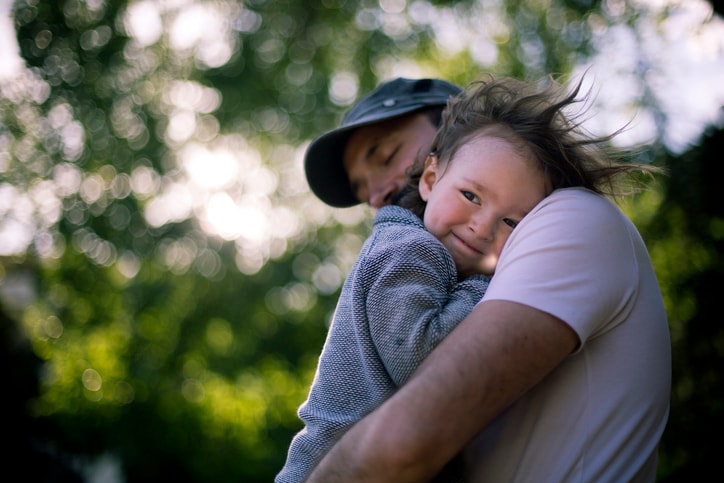In this article
Have you ever wondered why some kids are more attuned to their environment than others? Well, it could very well be because they are highly sensitive. That’s not to say that every child who shows sensitivity is a highly sensitive child (HSC), but there is research and information out there about this phenomenon.
According to Elaine Aaron, the psychologist and researcher who popularized the term “highly sensitive person” (HSP), roughly one in five children are highly sensitive.
With that said, we spoke with trained professionals and parents about highly sensitive children and how to best care for and help a highly sensitive child thrive and succeed in what can sometimes be an overstimulating world.
Key takeaways
- Highly sensitive children are born with a heightened awareness of their environments, which can lead to big emotions, deep empathy and strong reactions to stimuli. Understanding their unique traits helps parents support them with patience, connection and appropriate coping tools.
- While sensitivity isn’t a disorder, professional guidance can help rule out other concerns and provide strategies for thriving. With the right support, these children’s insight and compassion become powerful strengths.
- Parents play a crucial role by accepting their child’s sensitivity, regulating their own reactions and prioritizing connection. Mindfulness, therapy and skills like radical acceptance can help HSCs navigate an often overstimulating world.
What is a highly sensitive child?
This is the million dollar question — what is a highly sensitive child? Now, you’ll want to wipe away all of your preconceived notions about what an HSC looks like and leave it to the professionals to do the explaining.
“A highly sensitive child is easily flooded with emotions when responding to internal and external stimuli, both positive and negative,” says Bethany Cook, a licensed clinical psychologist and author of “For What It’s Worth – A Perspective on How to Thrive and Survive Parenting Ages 0 – 2.” “A sensitive child can become overstimulated with excitement and struggle to stop ‘racing around and screaming’ while another may cry every time they are startled.”
With that said, Michelle Felder, a licensed clinical social worker and founder of Parenting Pathfinders, adds that it’s important to note that being highly sensitive is not a disorder and cannot be diagnosed. However, if you want to know if your child is highly sensitive, there is a highly sensitive child test created by Elaine Aaron that parents can answer regarding their child.
The self-test involves a list of 23 common traits and habits of highly sensitive children. It’s not definitive; however, this test may help indicate the likelihood that a child is highly sensitive if 13 or more of the questions are marked true. While the highly sensitive child test can help gauge where the child is, it shouldn’t be used as the sole source of determining whether that’s where all of their heightened sensitivities stem from.
What are the signs of a highly sensitive child?
There is no one-size-fits-all list of signs that every child must have in order to be highly sensitive. Also, Felder says there’s nothing that causes a child to be highly sensitive — they are born that way.
Common traits of a highly sensitive child
However, there are some common traits that tend to be popular in many HSCs, according to Felder:
- Having strong emotional reactions to different stimuli in their environment.
- Experiencing intense crying spells.
- Being incredibly resistant to change or to new people and situations.
- Having big reactions to seemingly small triggers.
- Experiencing emotional extremes (e.g. being blissfully happy, inconsolably sad, terrified, or enraged).
- Being keenly aware of the emotions of those around them.
- Having a deep sense of empathy and compassion for others.
- Startling easily or getting distressed when there are surprises or unexpected events.
Some frequent sensitivities of an HSC:
Cook adds there are some specific things that a child might be highly sensitive to:
- Clothing that itches them.
- Loud noises.
- Bright lights.
- Sudden changes in routine.
- The emotional state of those around them.
- Sensations of hot and cold.
- Food touching on a plate.
- Food textures.
For Kelsey Brown, mother of a highly sensitive 6-year-old boy, she noticed particular characteristics of highly sensitive people in her son from when he was an infant and beyond.
“When he was an infant, he was very sensitive to loud sounds and noises, startling easily. He was sensitive to changes in routines and crowds. He had sensitive skin to certain detergents and diapers,” says Brown. “As a toddler, he was cautious and slow to warm up to new situations, he had a large vocabulary for his age and he was particular about food. As he ages,” she adds, “we are seeing his observant nature supporting his academics.”
What are the benefits of highly sensitive children?
While it might not always be the easiest raising a highly sensitive child, there are positive attributes, similar to those of gifted children, that an HSC may benefit from as a result.
“Highly sensitive children can be extremely insightful, in tune with those around them and have a deep sense of empathy and compassion for others,” says Felder. “There is a gentleness that many highly sensitive children possess, and their intuition can help them to develop deep connections with their friends and loved ones.”
What challenges does a highly sensitive child face?
Every child is subject to challenges in their life whether that’s with peers, school, relationships, etc. However, an HSC may have what feels like more needs when in reality they are simply different needs.
“One challenge is people not being understanding of their sensitivity, and they may be misinterpreted as being demanding or dismissed as emotional,” says Felder. “New situations can be challenging to enter and can easily become a source of frustration. It can also be difficult for highly sensitive children to adapt to limits or unexpected changes that happen in their world.”
What to do if I have a highly sensitive child?
Jeanette Lorandini, a licensed clinical social worker and owner and director of Suffolk DBT in New York, acknowledges the fact that having a highly sensitive child might be overwhelming for both the parent and the child.
For the parents, Lorandini says it’s important they acknowledge and accept that they have an HSC, try not to react to the behaviors out of impulse (ie. yelling, losing your temper in an attempt to get them to calm down) and remember to highlight the good behaviors.
For parents like Brown, she had to learn how to parent in a way that would be healthy and effective for herself and her child, who she says is “kind, empathetic and very intuitive.”
“My partner and I had to learn how to parent from a connection first standpoint, learning that it supports him best,” says Brown. “As parents, we’ve also had to also dig deep on the parenting we had as children and how that’s shaped us, including what triggers us and how to implement strategies to maintain emotional regulation in order to be a safe space for our children.”
As for the child, Lorandini suggests teaching kids mindfulness skills, going to therapy and practicing radical acceptance.
“Radical acceptance is a dialectical behavior therapy (DBT) skill that allows a person to surrender to their current circumstances. We often fight so much to change our situation that we end up worse off than we started,” says Lorandini. “In this case, radical acceptance allows a highly sensitive person to release any negative feelings they might have about their emotional sensitivities and fully accept who they are.”
When should I seek professional help for a highly sensitive child?
Before you come to the conclusion that your child is highly sensitive, Felder says you’ll want to meet your child’s pediatrician and a licensed therapist to rule out any underlying physical and psychological conditions and mental health issues.
Additionally, Felder adds you’ll want to seek out professional help if your child’s sensitivity is interfering with their relationships, ability to function at home or school or is negatively impacting their overall functioning day-to-day.
Your care team might be able to help come up with coping strategies and methods to best help your child and family dynamic as a whole.





